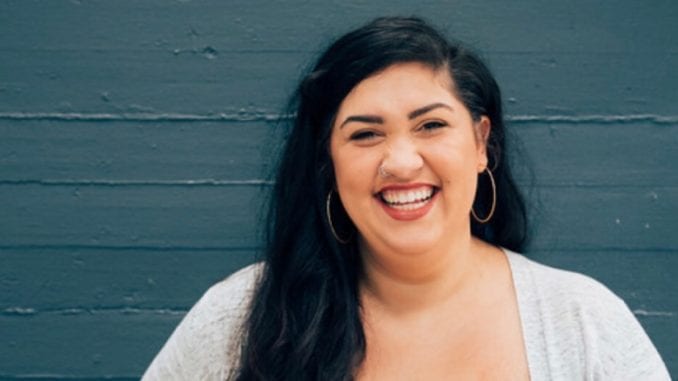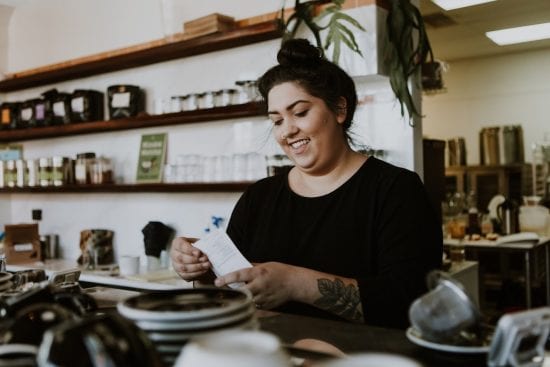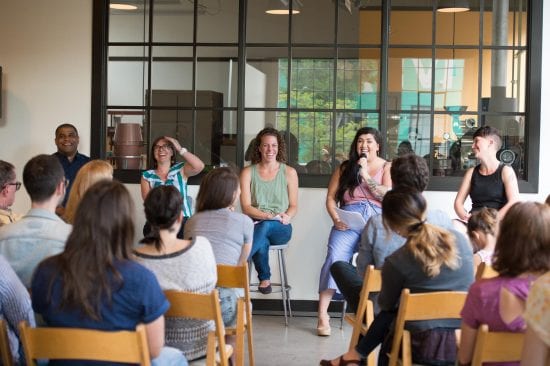
Erica Escalante of The Arrow Coffeehouse in Portland, Ore., opens up about identity, being your own boss, and how to juggle projects in part one of this two-part interview.
BY ASHLEY RODRIGUEZ
BARISTA MAGAZINE ONLINE
Erica Escalante is a person I’ve admired from afar for a long time. I’ve followed her on social media and listened to her on the Keys to the Shop, podcast, and knew that this was someone to follow. Erica is the owner of The Arrow Coffeehouse in Portland, Ore., and juggles a number of different food and service projects in the city.
To say that I’m honored to share this interview is an understatement. I acknowledge that some of this is personal to me. However, there are no words to describe the insights, observations, and shared experiences Erica outlined in this interview, and I’d only be delaying your opportunity to read this interview if I wrote anymore. Part two—which is just as mind-blowing as part one—comes out tomorrow.
Ashley Rodriguez: How did you first get started in coffee?
Erica Escalante: I got started in coffee right after I finished high school when I got a job at Starbucks. It was the only coffee shop I had ever known and I loved it. I knew I could be fast and friendly, and I really enjoyed tasting all the things.
AR: What are some of your earliest coffee memories?
EE: I remember the first time my mom let me taste her coffee. I was 9 years old, and I was blown away. It was a creamy white color and tasted like candy! After that it was mostly gas station stops to get a vanilla cappuccino from the dispenser for $1.19 until middle school, when my best friend’s mom treated us to this place called Starbucks. Whoa. Those blended coffees were a game changer.
AR: What drew you to opening a business? How did you launch your coffee shop?
EE: My partner and I started running our own business at a young age, and I really loved the idea of not listening to anyone and making our own decisions. Every time I worked at a shop, I would continuously think about what I would do differently and would often get frustrated about things that I didn’t like.
I had left coffee for a little bit of time to run my own babysitting service, and I was so busy and making a lot of money. We went through a really difficult time in our life (my partner’s dad died a couple months after our wedding) and it really, really affected us. I ended up taking a lot of time off to handle it and shortly after, a shop I used to work for called asking if I could work some shifts. They had gone through some rough turnover and just needed help. I jumped back into it, and turns out that they were ready to be done after nine years. I was able to work out an unprecedented deal with them that allowed me take over ownership.

AR: You operate and work on a ton of projects—The Arrow Coffeehouse, you’re the co-owner of Kitchenhood Commissary, and you manage The Abbey Coffee Project—how do you manage to find time?
EE: I think this is a combination of a couple things:
1. Delegation. If I add on something, I have to pass along something else. For example, I have an amazing assistant who does a ton of organizational things for me. She puts together my day-to-day calendar, pays the bills, does the bookkeeping. Reminds me if my kid has something going on at school! I don’t know what I would do without her, and I wouldn’t be able to handle these projects without her. My mom still does a ton of stuff to help me out, and she can be found doing dishes in one of my cafes from time to time if we’re short handed—yes, I have the best mom in the world. I’m married to a wonderful man who really takes on most of the responsibilities of our home life.
I think that cliché question of “How do you do it all?” gets asked to me often, and the true answer is that I really don’t do it all. I have a team of people that works to help me accomplish everything. It looks like the work of 10 people because it actually IS the work of 10 people. Not just me.
2. Efficiency and boundaries. I put these together because you really have to analyze how long something should take you, and then work efficiently to get it done in that timeframe. If a meeting should only take one hour, I can’t let it drag on to three. You have to learn how to make decisions faster and more efficiently. You can always spend more time on your business and there is always something to get done and things to improve, but I have to set boundaries and really work toward sticking to them or I run out of time or drop the ball on something else. Of course there are always exceptions, but it’s been really important to not let things take up more space than they should.
AR: How do you think your friends would describe you? Looking at all the projects you take on, I’d imagine you’re the type of person who says yes to a lot of things!
EE: Haha … I do think this to be true. I have a feeling that my friends would describe me as DYNAMIC. I am always busy and evolving and thinking. (Word to all those Sagittarius folx and Enneagram 8s out there). I’m very passionate and really love people a lot. They’d also probably say I’m talkative too, hopefully not in a bad way.

AR: How does being Latinx affect the way you see coffee or see yourself in the industry? Do you think it gives you a perspective that others might lack?
EE: I’m half Salvadoran (first generation) and half white. I used to try and escape my Latin culture growing up because I was raised in a very white rich suburb. Speaking Spanish was shameful to me, being poor was shameful. We spent a lot of time with my Salvi family and that culture was such a stark contrast to the kind of area where I lived … there’s a big story there that makes me sad, but I’ve honestly heard over and over again from first-generation Latinx. I think it’s good to talk about it. When I moved to Portland at age 18, I realized just how *not white* I was, how different I was. The first time I had a really harsh blatant racist encounter was in Portland.
I feel this a lot in coffee culture, too, about how different I am. There is such a huge lack of warmth, which is one of the best parts of my family culture and it’s the most alienating thing. You could walk into a room and no one says hi to you. No one smiles or hugs or anything. It’s very different. It has changed the longer I’m in the industry and the more friends I make, but I felt so alone in the beginning and still feel awkward a lot of the time. I initiate a lot of hugs and smiles and have had to awkwardly initiate conversations with people to make friends and connections.
There is also a huge lack of representation. I’ve always had brown skin and have always drawn the most inspiration from other women with brown skin. There’s really not many seen in this industry, and the more I dive in, the more *special* I feel. Add to the list that I am very young and I am a fem woman. … Well, there’s a lot of factors at play here when it comes to how I feel people treat me. I heard Isabela Raposeiras speak this year at Re:co. She owns Coffee Lab in Brazil, and she was speaking on bringing your own unique self into your café. Wow—I just cried listening to her speak. I wish I could have more experiences listening to brown women speak on these things.

